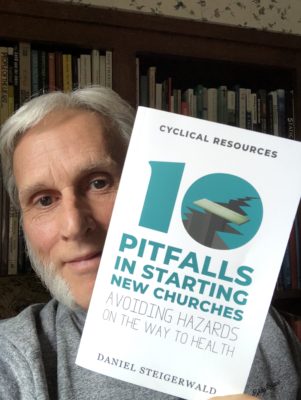Planting Challenge 3: The team lacks capacities to lead forward and steward the outward impulse
In recent years I worked closely with the leaders of two local planting initiatives. One was an excellent teacher and a strong advocate for justice and compassion initiatives. With those gifts he was able to rally his team to engage various needs in several neighborhoods. The other had a strong relational WOO strength. With warm enthusiasm, she could interact naturally with nearly anyone and get them to show up at parties and theme-focused groups. These two starters stepped out boldly, working more than half-time at planting while also maintaining other paying jobs. Sadly, with all their efforts, neither initiative lasted beyond two years. In retrospect, I’d say two primary issues hindered the longevity of both projects. I’d like to shed light on those, as too many church-starts fizzle out when they’re are under-addressed.
The first issue relates to the ratio of outward to inward energy present within the lead team. In order to see a new missional church emerge out of whatever cultural subset(s) God has us working among, the startup team needs to generate a persistent lean into culture and into the networks and social havens of people outside the church. Generally, this “out-stretch” must be at a pace and degree that exceeds the inward “let’s create a culture for members” force. If it’s not, the likelihood of it becoming a sustainable church, able to plant the gospel and make new disciples within its context, will be greatly diminished. Alan Hirsch and others assert that it’s the Ephesians 4:11 apostolic, prophetic and evangelistic (A.P.E.) orientations that enable a team to maintain this steady out-stretch. And while Hirsch would argue that churches ought to keep these in an integrative balance with the nurturing, people-development strengths of shepherds and teachers, church planting initiatives must not allow A.P.E. energy to be supplanted by the inward-working gifts or the plane will never get off the ground.
The lead planters mentioned above moved quite naturally in some A.P.E. gifts. One was strongly prophetic (advocating for the embodied witness of a demonstrated gospel). The other very evangelistic (relating and recruiting to the cause). Both, however, were truly shepherds at heart. They continually skewed the energy of their initiatives toward encircling and nurturing people. The pastoral-discipling impetus outstripped their ability to cultivate and steward missionary engagement and witness within their respective settings. Eventually, even though many people received wonderful pastoral care, this under-accenting of the A.P.E. ministries led to a stifling of growth, and finally, implosion. In retrospect, these leaders may have been better suited to either fill a pastoral vacancy somewhere or work alongside a lead starter-type, taking on the pastoral and discipling needs of the forming core group.
Of course, the demise of any startup isn’t usually related to any single factor. And in the case of these projects, this proved to be true. Another depleting issue was at play that also plagues many entrepreneurial endeavors: neither of these team leaders exhibited the leadership savvy to galvanize the core group’s activities into sustainable, growing forms of church. In short, they were better pastoral leaders than leaders of startups, and both were unable to empower the right kind of co-leaders to cover for what they lacked.
Just so you know, when I mention “leadership savvy” I’m not talking about a capacity to rise to some archetypal depiction of the ideal church planter, you know, the strong, directive, decisive, charismatic, communicator type suited to starting big attractional churches. I’m referring to ability to lead and the measure to which that is activated to facilitate a missioning group forward into ecclesial sustainability. If leadership is primarily about influence, then almost anyone can lead in some capacity. As leadership guru Dr. J. Robert Clinton once put it, nearly every member of the body can engage in a “leadership act” – a group-influencing behavior that changes the way the group acts or thinks. However, Clinton argues, just because one has the capacity to carry out leadership acts doesn’t mean they have a gift or calling to lead. Only those who frequently and persistently engage in leadership acts can rightly be called “point leaders.”
An important sidelight here: if you’re an American, you’ll probably agree that we’re overly enamored with “leadership” or the importance of being a “leader.” We ought to regularly remind ourselves that the calling or gifting to lead is only one functionality among many that are needed to activate healthy communal bodies or organizations. The Apostle Paul even puts the gift of leading toward the end of his list in Romans 12:6-8. This doesn’t mean leaders don’t play critical roles, or that we should dumb down the concept of leadership, suggesting that anyone can do it. But as with any gift or calling we’ve been given or to which God has summoned us, we ought to intentionally work to develop and season it over time – just as Paul exhorted Timothy to “fan into flame the gift of God,” a gift that appears to have involved a commissioning for apostolic leadership.
Church planting is more than simply rallying together and cohering a group of Christians into an identified community or a Sunday gathering. In order to form and animate a local body of Christ into a visible, sustainable and accessible local expression, starters must become adept at a number of leadership behaviors. They must cultivate the core group’s grasp of its identity – its calling, its unique vision and values, and its theological non-negotiables. They must be champions of all aspects of that identity, inspiring all involved to live into it even as they themselves live into it. They must be able to mobilize groups of people into activities and processes that are meaningful and that tie into a greater communal whole. Ultimately, they must lead their team and core group in planting the gospel in their local soil, for that is the key to making new disciples of Jesus. Carrying out these kinds of functions requires adaptive, strategic leading, ideally within the ethos of a collaborative point team.
In summary, starting sustainable [hopefully reproducing] missional churches requires both an enduring outward stance and regular acts of catalytic leading. In the early stages, the initiative may be mostly about missional discerners teaming together to get a lay of the land and hopefully establish some relational/locational beachhead. Eventually this team will need to evolve or be amended to include load-bearing leaders gifted at overseeing groups and activities that nurture missional engagement and the forming of a solid core group. All the while, the startup must maintain a high degree of A.P.E. activation, at the least to help counter the natural inward-turning force that Christians quickly generate when they taste authentic community together. One thing I would emphasize in closing is that startup teams deficient in leader strength or A.P.E. functionality should not be dissuaded from initiating the planting process. If they are willing to learn some needed skills along the way, access good coaching and mentoring, and create a berth for additional leader(s) to eventually emerge or join them, they may well be able to establish an enduring expression of church that suits who they are and what they have to bring.
Some questions and suggestions for team leaders:
• How would you evaluate your team’s “out-stretch”? It’s leadership savvy? What measures could you take to undergird both elements?
• If you feel daunted by the entrepreneurial and leadership behaviors needed to start a missional church, consider seriously: a) hiring a coach-mentor familiar with the terrain of leading startups – it’s almost like having a trusted out-of-context teammate; b) identify a local A.P.E. network in which to participate (e.g. Forge http://www.forgeamerica.com/ or any regular gathering of entrepreneurial types).
• Be on the lookout for potential load-bearing leaders – those in your forming community who often influence others to take action or adopt new perspectives. Give them ministry-related assignments and see if they can: “be faithful in the smaller things;” prioritize being available to the project; and demonstrate a humble, learning spirit.



